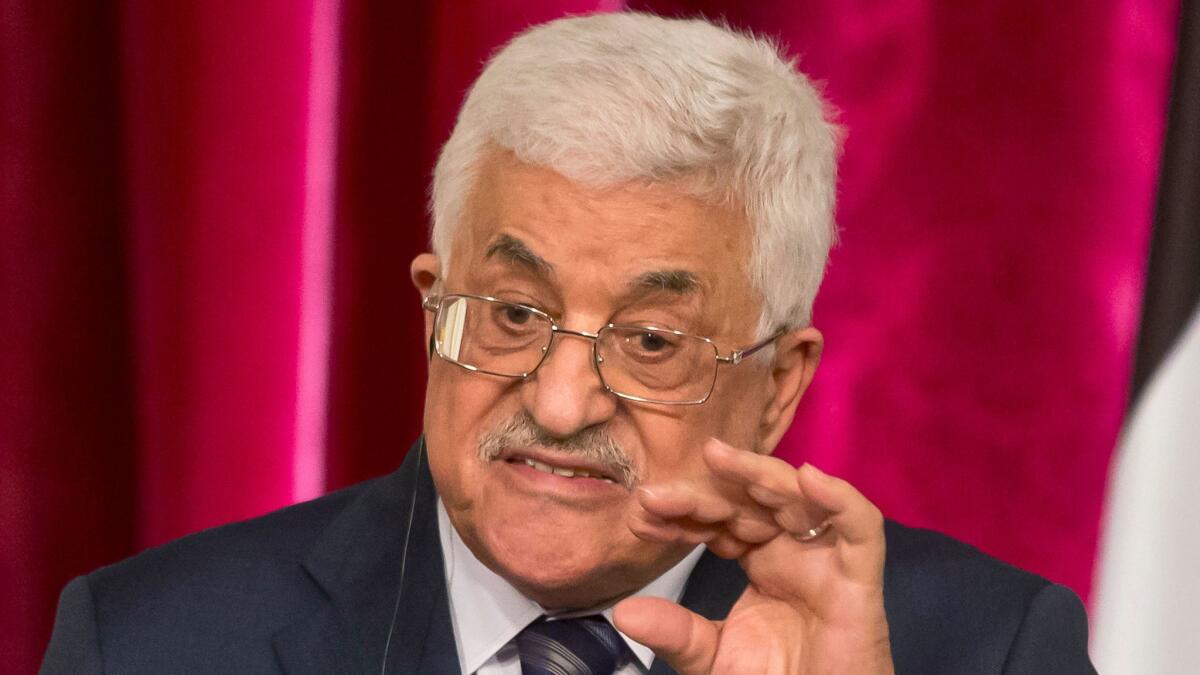Rival Palestinian groups appear to move toward unity after a 10-year split

- Share via
Reporting from Jerusalem — The Palestinian Authority’s Fatah movement and its militant rival, Hamas, on Sunday appeared to move toward ending a 10-year split after Hamas vowed to accept conditions including a unity government and general elections in the West Bank and Gaza Strip.
Hamas, which took control of Gaza in 2007, also said it would dismantle its governing body, known as the administrative committee, and allow the unity government to run the area.
By abandoning its hold over Gaza, Hamas would accept the conditions called for by Palestinian Authority President Mahmoud Abbas, whose internationally recognized government is based in the West Bank city of Ramallah.
Abbas’ Fatah group was expelled from Gaza 10 years ago, when Hamas staged a putsch in the besieged coastal enclave. As a result, Abbas views Hamas’ administrative committee as an illegitimate government. The United States, Europe and Israel define Hamas as a terrorist group.
Israel and Egypt, the two countries with borders with Gaza, maintain them virtually closed.
Fatah said Sunday that it welcomed the possible reconciliation, but wanted to see what happens beyond vows by Hamas. Other attempts at unity have failed.
Representatives of the two groups recently had engaged in separate talks with Egyptian officials in Cairo. Each side spoke with Egyptian officials who acted as intermediaries.
“Through negotiations conducted by Egypt, Hamas has accepted that in order to revive and bring back Palestinian unity between Gaza and the West Bank they will legitimize the government of consensus led by Prime Minister Rami Hamdallah,” Nabil Shaath, a senior Fatah member, said in an interview. “He is invited to go to Gaza and take over all the ministries there.”
Hamas official Husam Badran said discontinuing the group’s administrative committee would allow the government to assume its responsibilities in Gaza.
“We accepted that as a sign of our good will toward reconciliation,” he said, the Associated Press reported.
In recent months, the dispute between the two factions had worsened. In an attempt to compel Hamas to give up control, Abbas drastically reduced the supply of electricity to Gaza to between two and four hours a day and cut the salaries of Gaza government employees. Gazans have also been prevented from seeking medical attention in the West Bank or in Israel.
On Sunday, several Palestinian analysts and officials said the tactics apparently worked but no one could be sure about what might happen next.
Khaled Abu Toameh, an expert on Palestinian politics, said Sunday’s announcement should be viewed cautiously.
“It’s not the first time unity has been loudly proclaimed,” he said in an interview. “We always hear about compromises and agreements and nothing on the ground actually changes. It all depends on a mechanism for the changeover or an actual schedule for the change to take place.”
Hamas had agreed to allow Gazans to participate in the Palestinian municipal elections held May 13, which were expected to be the first all-inclusive elections since 2007.
But differences between Hamas and Fatah led to a Hamas boycott of the vote, with the group saying it would participate only after “ending disagreements, achieving reconciliation, and uniting Palestinian institutions, including at the political, judicial, and security levels.”
Palestinian observers believe the announcement Sunday stemmed from the Palestinian Authority’s desire to show that its sanctions against Gaza, which have been broadly critiqued for imposing suffering on an already strained population, have brought results.
“The measures that were taken by the Palestinian Authority were measures to put pressure on Hamas. We don’t use civil war tactics against people. All these sanctions will be lifted,” Shaath said.
Shaath said a unity government faces assuming the responsibility of helping the residents of Gaza in areas such as electricity, hospitals and salaries.
Abbas is expected to attend the United Nations General Assembly gathering in New York this week.
Tarnopolsky is a special correspondent.
UPDATES:
5:00 p.m.: This article was updated throughout with Times reporting.
This article was originally published at 10:45 a.m.
More to Read
Sign up for Essential California
The most important California stories and recommendations in your inbox every morning.
You may occasionally receive promotional content from the Los Angeles Times.










